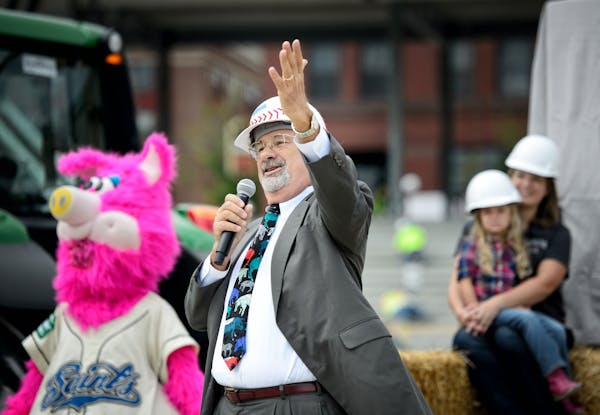The owners of the Minnesota Vikings created an unexpected bidding war Tuesday over the development of a piece of land next to the future downtown Minneapolis football stadium.
Leaders with the team told the City Council that the city is not getting the best possible deal from Ryan Companies, which won the rights to build on top of the taxpayer-backed parking ramp across from the stadium.
Team owners are concerned that Ryan's downsizing of its development and potential delays would be detrimental to the entire area. A representative for team owners Zygi and Mark Wilf, who are billionaire New Jersey real estate developers, offered what they say is a sweeter development deal, which could mean millions more for taxpayers.
"We're concerned with the uncertain impacts on the stadium and the city green space. And the front doorstep of both," Vikings Vice President Lester Bagley said. "And we're concerned that the proposal before you today is not a market-value proposal for the city."
This new conflict surfaced as construction races ahead on the $1 billion stadium and surrounding development that expected to transform the east edge of downtown into a vibrant retail, restaurant and residential stadium district.
Ryan's president, Pat Ryan, tried to assuage any concerns that they would not deliver their proposed building. "We have a relationship with this city that goes back decades," he said. "And we've never gotten to this point in a project where we haven't ultimately executed."
Minneapolis leaders are seeking as much revenue as possible in return for allowing a company to build structures around and atop a new city-financed stadium parking facility on 4th Street.
The team owners unveiled their own retail and housing proposal at a testy City Council meeting Tuesday to compete with Ryan Companies, which won the rights in March but is scaling back its plans amid financial concerns and wants to pay the city less for the development rights.
Ryan is already deeply invested in the fate of the Downtown East area, as the developer of the parking ramp, Wells Fargo corporate towers and a large adjoining park that will serve as a scenic gateway to the downtown stadium.
Precisely how much the city gets from the sale of the development rights is an important matter at City Hall, since the money is needed to help fund construction of the nearly two-block urban park across the street. But the debate is a tough one for the new council, many of whom view the Vikings warily after the acrimonious debate over subsidizing the new football stadium in 2012.
Ryan had committed to pay the city $5.6 million in exchange for the right to develop a Radisson Red hotel and 200-unit apartment building. But the hotel plan fell through. Ryan's new proposal would give the city just $3 million for a 25- to 35-story apartment tower, with a new level of parking. The city would get the full amount only if Ryan proceeds with the project by 2022 and leases out 70 percent of the units.
Some council members are not happy with Ryan's changes and the diminishing financial reward for taxpayers.
"How can you … describe this as anything other than a bait and switch?" asked Council Member Lisa Goodman, chairwoman of the city's community development committee.
Garden Communities, which is owned by the Wilfs, would develop a proposal that includes a guaranteed $4.6 million for the city in order to build a 16- to 18-story building featuring residential, retail and a television broadcast studio.
Parking has played a key role in the ongoing disagreements between Ryan, the team and the Minnesota Sports Facilities Authority, which will own the ramp. The 1,600-spot parking facility in question helps satisfy a requirement of the Viking stadium measure passed at the Capitol. Ryan had initially expected to use some of those spots for its development, in addition to building 200 new ones.
"When you're building a large development on top of a parking ramp, it would seem to be the logical source of parking spaces for the project," Ryan Vice President Tony Barranco told the committee.
But authority officials said flatly that could not happen.
"This is a publicly owned ramp," said authority chairwoman Michele Kelm-Helgen, noting the ramp is being paid for with public debt. "We can't give parking spots to a residential developer or individual apartment residents. It's not legal. Our attorney was very clear that that would never work."
But even building 200 extra stalls above the parking ramp, a feature of the latest proposal, has raised objections from the Vikings. Bagley told the council that a traffic management firm told them that "the 200 stalls would have significant impact on the egress of fans from the game after the game."
The team's stadium project leader, Donald Becker, said they merely wanted assurances that tenants would not leave during games. "The way it was portrayed is we're preventing them from building 200 spaces," Becker said. "And that's totally false. This was an open issue — we presumed we would work it out somehow."
Other factors were also at play in the new bid. Ryan said in documents submitted to the committee that their new bid is lower because certain modifications to the ramp, like a loading dock, were not possible. They also have more precise estimates about pricing for the project.
Goodman is concerned about the longer, seven-year development period. "I maybe could have gone along with the reduction in price, but my biggest objection is the lack of a guarantee of any development anytime soon," Goodman said.
City council members are now mulling the competing proposals.
Eric Roper • 612-673-1732
Twitter: @StribRoper
Newspaper boxes repurposed as 'Save a Life' naloxone dispensaries

St. Cloud house vies for Ugliest House in America

Hennepin County paid $240K to settle former Sheriff Hutchinson's workers' comp claim
Female inductee in Minnesota Aviation Hall of Fame is flying high

